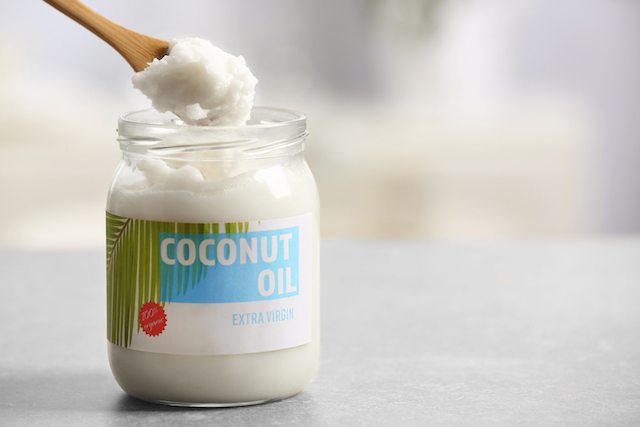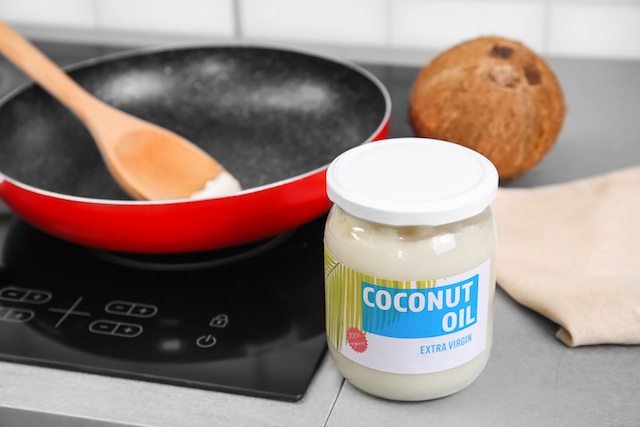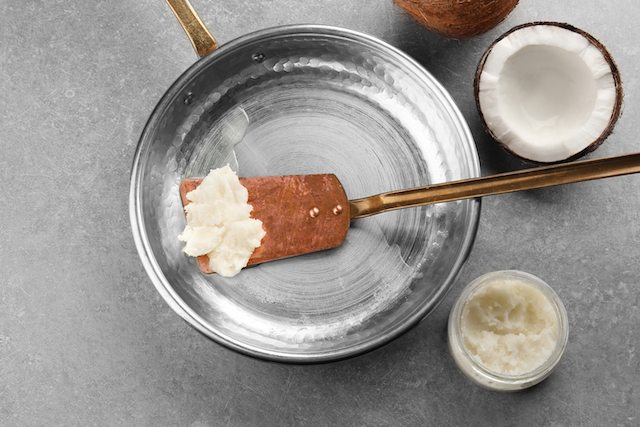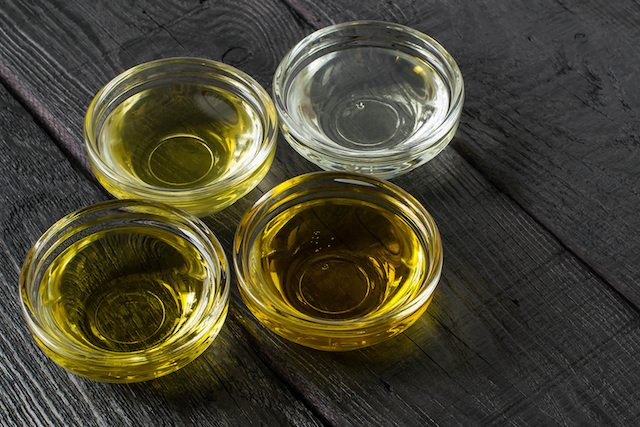The American Heart Association (AHA) released a report a few months ago advising advising against consuming high saturated fat foods, including coconut oil. The AHA claims that all high saturated-fat containing foods, including coconut oil, cause heart disease. Because of the many lauded benefits of coconut oil (see studies below) and the fact that native island populations that have traditionally consumed coconut oil for many generations have historically good cardiovascular health, many researchers and wellness experts are mystified by this unfounded claim.
But, as you read below, the basis of this claim starts to make more sense when you see the financial ties that the AHA actually has in big food and pharma, including around the un-coconut oil, ie vegetable oil…
There has been a well-deserved backlash to this report since a careful review of the data shows that coconut oil is found to be “not guilty”! In fact, studies have shown coconut oil to be beneficial to heart health. The report is probably based less on sound science than by longstanding bias, commercial interests and the AHA’s need to reaffirm nearly 70 years of its “heart healthy” advice.
The AHA’s Questionable Historic Position
Saturated fats have been discouraged since 1961 when the AHA launched the world’s first official recommendations to avoid saturated fats, along with dietary cholesterol, in order to prevent heart attacks. This “diet-heart hypothesis” was adopted by most leading experts, though it had never been tested in clinical trials — the only kind of research that can establish cause-and-effect [1].
It wasn’t until 2010 that researchers unearthed several previously unpublished studies that clearly contradicted the AHA’s cherry-picked publications. The results of these studies, including a large NIH-funded study, did not support the government’s Dietary Guidelines for Americans, in regards to saturated fat. The reliability of information from the AHA has been questionable in the past but the icing on the cake happened when they went after coconut oil [2].
Not All Saturated Fats Are Created Equal
Yes, coconut oil is considered a saturated fat, but not all saturated fat is created equal! Unlike some other saturated fats, coconut oil is comprised of about 65% medium chain triglycerides (MCT), which is a fat that is rapidly absorbed into the bloodstream and burned as fuel for our bodies.
Research has found that the consumption of MCT’s can help reduce body weight, body fat, and triglycerides levels. Along with that, coconut oil also contains lauric acid, which is a component of breast milk and contains various antimicrobial and antibacterial properties. Other components of coconut oil include oleic acid, linoleic acid, and Vitamin E [3, 4].
Although the report from the American Heart Association states that saturated fat from coconut oil raises LDL, or our “bad cholesterol,” it fails to point out that it can increase our HDL, or our “good cholesterol.” Plus, research has found that not all LDL is bad [5].
A study looking at the relationship between coconut oil and coronary heart disease found that coconut oil increased HDL, while also showing a reduction in body mass index and waist circumference. So not only can coconut oil improve our heart health, it can also help reduce other risk factors associated with heart disease [6].
Another study which was a randomized and double-blind study found that consuming coconut oil increased HDL while consuming soybean oil (which is predominately unsaturated fat) actually increased total cholesterol and LDL levels [7].
While the AHA is recommending corn, cottonseed, canola, safflower, sunflower, and soybean oil, evidence has elucidated that those oils are high in omega-6 fatty acids. Omega-6 fatty acids promote carcinogenesis and inflammation [8]. What on earth?! One has to wonder about the basis of such recommendations. It really is a head-scratcher. But read on…
The typical American diet contains excessive amounts of meat, refined grain products, and dessert foods. Such a diet can have numerous adverse biochemical effects, all of which create a pro-inflammatory state and predispose the body to degenerative diseases [9].
A diet high in omega-6 fatty acids can promote inflammation and disease. Nearly all degenerative diseases have the same underlying biochemical etiology, that is, a diet-induced pro-inflammatory state. The Standard American Diet (or the SAD diet, and sad it truly is for the most part!), rich in omega-6 fatty acid consumption, generates the pro-inflammatory state that facilitates tumorigenesis and other degenerative diseases.
Low Cholesterol is Linked to Higher Risk of Mortality
Low total cholesterol, formerly believed to be protective against cardiovascular disease, has been demonstrated to have a litany of ill effects. In particular, women with a total cholesterol below 195 mg/dL have a higher risk of mortality compared to women with cholesterol above this cut-off [10].
Low cholesterol has been correlated with Alzheimer’s disease, dementia, suicide, homicide, accidental deaths, and morbid depression [11].
In a group of men 50 years and older, researchers found depression to be three times more common in the group with low plasma cholesterol. Men with total cholesterol below 165 m/dL were also found to be seven times more likely to die prematurely from unnatural causes, including suicide and accidents. “In several clinical trials of interventions designed to lower plasma cholesterol, reductions in coronary heart disease mortality have been offset by an unexplained rise in suicides and other violent deaths” [12, 13].
So, just because coconut oil has some cholesterol doesn’t mean it’s bad! We need to look at this amazing food from a wider perspective.
Coconut Oil Has Many Benefits
A plethora of health benefits have been noted in scientific literature regarding coconut oil consumption. For instance, the following studies, as catalogued in the GreenMedInfo database, have revealed metabolic, immunomodulatory, and cognitive benefits of the dietary inclusion of coconut oil.
For instance, extra virgin coconut oil consumption has been demonstrated to significantly reduce body mass index (BMI) and waist circumference (WC) and produce significant increases in concentrations of HDL cholesterol in patients with coronary artery disease (CAD). Another study concluded that virgin coconut oil is efficacious for the reduction of waist circumference, especially among males [14, 15].
Likewise, another study demonstrated that dietary coconut oil reduces visceral adiposity and elevates HDL cholesterol in women, thus improving both anthropometric and biochemical risk factors for metabolic syndrome [16].
Virgin coconut oil improves glycemic control in rats that were fed high fructose, and is postulated to be “an efficient nutraceutical in preventing the development of diet induced insulin resistance and associated complications possibly through its antioxidant efficacy” [17].
Research supports the use of coconut oil for obesity, dyslipidemia, insulin resistance, hypertension, and pathologically elevated LDL, all of which constitute risk factors for diabetes, cardiovascular disease, and Alzheimer’s, the last of which is now being considered to be Type 3 Diabetes [18].
In addition, in a prospective study of patients with Alzheimer’s, improvements in cognitive function were observed for patients administered extra virgin coconut oil, since “medium chain triglycerides are a direct source of cellular energy and can be a nonpharmacological alternative to the neuronal death for lack of it, that occurs in Alzheimer patients”. In other words, brain cells die when they lose their sources of energy. The medium chain triglycerides in coconut oil can be a source of energy that keeps brain cells from dying [19].
Aside from being a source of cellular energy, the hormones, or cytokinins, and phenolic compounds found in coconut may prevent aggregation of amyloid-β peptide into plaques, thus arresting a critical step in development of Alzheimer’s disease [20].
Research also suggests that coconut oil may directly stimulate ketogenesis in astrocytes and provide fuel to neighboring neurons as a consequence, thus improving brain health. Along with its preventative capabilities, coconut oil mitigates amyloid beta toxicity and rescues exposed brain cells, increasing cell survival pathways [21].
Lastly, research has demonstrated anti-inflammatory, analgesic, antibacterial, and anti-fungal properties of virgin coconut oil [22, 23].
Unless you are part of the minority of the population that carries the APOE4 allele, a polymorphism that causes increased risk of developing Alzheimer’s disease with saturated fat consumption, there is no reason to avoid coconut oil [24].
AHA: Can’t Bite The Hands That Feed Them
That the AHA should be so resistant to updating its view of saturated fat, particularly coconut oil, despite so much legitimate science, could simply reflect the association’s unwavering devotion to a belief it has promoted for decades. OR it could be due to its significant, longstanding reliance on funding from interested industries, such as the vegetable-oil manufacturer Procter & Gamble, maker of Crisco.
Proctor and Gamble essentially launched the AHA into the spotlight as a nation-wide powerhouse in 1948 by designating the then little-known group to receive all the funds from a radio contest it sponsored (about $17 million). Could it be coincidence that Proctor and Gamble is also the leading manufacturer of prescription and over-the-counter medications for respiratory ailments – many of which are caused by inflammation linked to oils high in Omega-6 fatty acids?
More recently, Bayer, the owner of LibertyLink soybeans, pledged up to $500,000 to the AHA. Could this have something to do with the AHA’s continued support of soybean oil, by far the dominant ingredient in the pro-inflammatory “vegetable oil” consumed in America today [25]?
A blistering report from the Huffington Post says the new cardiovascular disease prevention guidelines are “an egregious example of much that is wrong with medicine today [26].”
The guidelines propose a vast expansion of the use of statins in healthy people, recommending them for about 44 percent of men and 22 percent of healthy women between the ages of 40 and 75. According to calculations by John Abramson, lecturer at Harvard Medical School, 13,598,000 healthy people for whom statins were not recommended based on the 2001 guidelines now fall into the category of being advised to take moderate or high intensity statin therapy.
The new guidelines simply don’t make sense given that statins are not as effective as their proponents claim, and there is so much documented incidence of adverse effects. At least 18 percent of people who take them are affected by the increasing list of side effects. These side effects include muscle pain, weakness and damage to cataracts, cognitive dysfunction, nerve damage, liver injury and kidney failure.
The American Heart Association (AHA) is a nonprofit organization that claims that its mission is to “build healthier lives free of cardiovascular disease and stroke.” Yet in its 2011-2012 financial statement, the AHA noted $521 million in donations from non-government and non-membership sources and many well-known large drug companies, including those who make and market statins, contribute amounts in the $1 million range. Hmm….that’s a lot of “non”-profit.
It seems there are good reasons to suspect the AHA of being in cahoots with its drug company partners to boost drug sales, particularly cholesterol-lowering statin drugs. Even the AHA online calculator for determining risk of heart disease is believed by some estimated to over predict risk by an astonishing 75 to 150 percent.
The financial ties between large pharmaceutical companies and the AHA are numerous and include huge donations from Myers Squibb (BMS), Eli Lilly, Merck and Pfizer. BMS, along with Merck and Pfizer are national sponsors of AHA’s Go Red For Women, a heart disease awareness campaign whose website advocates prescribing more statins than ever before.
“Cholesterol-lowering statin drugs should now be prescribed to an estimated 33 million Americans without cardiovascular disease who have a 7.5 percent or higher risk for a heart attack or stroke within the next 10 years. That’s according to a new cholesterol guideline from the American Heart Association and American College of Cardiology. This is a dramatic change from the 2002 federal cholesterol guideline, which recommended that people should only take a statin if their 10-year risk level exceeded 20 percent.”
The Women’s Health Initiative, a federal study of over 160,000 healthy women to investigate the most common causes of death, disability and poor quality of life in postmenopausal women, showed that a healthy woman’s risk of developing diabetes was increased 48 percent (!) compared to women who were not on a statin [27].
In 2010, the AHA received $21,570 from statin maker AstraZeneca to run an AHA course about “emerging strategies with statins” at the Discovery Institute of Medical Education and almost $100,000 for learning projects including “debating controversial topics in cardiovascular disease.” The AHA defended the deceptively marketed and controversial cholesterol drug Vytorin. Did that have anything to do with the $2 million a year the AHA was taking from marketer Merck/Schering-Plough Pharmaceuticals?
The AHA also rakes in millions from food companies which are also million dollar donors and which pay from $5,490 to $7,500 per product to gain the “heart-check mark” from the AHA. This label supposedly indicates a “heart healthy” food and is renewable, at a price, every year.
The foods designated with this “heart-check mark” have to be low in fat, saturated fat, and cholesterol yet Boar’s Head All Natural Ham somehow made the cut as did Boar’s Head EverRoast Oven Roasted Chicken Breast . Such processed, high-sodium meats are high in trans fats, raise blood pressure, the risk of cardiovascular disease and the risk of diabetes.
A review of almost 1,600 studies involving one million people in ten countries on four continents showed that a 1.8-ounce daily serving of processed meat raised the risk of diabetes by 19 percent and of heart disease by 42 percent. So, the “heart-check mark” appears to be one more thing in the list of AHA endorsements that is simply bought rather than earned. If the coconut oil industry hasn’t received an endorsement from the AHA, maybe it hasn’t been greasing the right palms [28].
So, you might be asking what raises our risk for heart disease if coconut oil doesn’t?
Consuming vegetable oils, foods with trans fats (which are the most harmful type of fat for us), processed carbohydrates and sugars, living a stressful lifestyle, not getting adequate sleep, and lack of physical activity are all some risk factors associated with an increase in heart disease.
It is clear that coconut oil is not only NOT a risk factor for heart disease, it is beneficial for our hearts as well as our overall health. Thanks for reading this, as we all need to be aware of motivations behind recommendations from big organizations, even ones that are supposedly looking out for us.
So keep following your Beauty Detox recipes, and cooking and/or baking with coconut oil when you need a bit of oil to cook with!
In love and health,
Kimberly
[1] Dietary fat and its relation to heart attacks and strokes. Report by the Central Committee for Medical and Community Program of the American Heart Association.[2] Test of effect of lipid lowering by diet on cardiovascular risk. The Minnesota Coronary Survey.
[3] Consumption of medium- and long-chain triacylglycerols decreases body fat and blood triglyceride in Chinese hypertriglyceridemic subjects.
[4] In vitro killing of Candida albicans by fatty acids and monoglycerides.
[5] ‘Bad’ cholesterol not as bad as people think, study shows
[6] A COCONUT EXTRA VIRGIN OIL-RICH DIET INCREASES HDL CHOLESTEROL AND DECREASES WAIST CIRCUMFERENCE AND BODY MASS IN CORONARY ARTERY DISEASE PATIENTS.
[7] Effects of dietary coconut oil on the biochemical and anthropometric profiles of women presenting abdominal obesity.
[8] Omega 6 Fatty Acids are detrimental to cardiovascular health.
[9] The diet-induced proinflammatory state: a cause of chronic pain and other degenerative diseases?
[10] Is the use of cholesterol in mortality risk algorithms in clinical guidelines valid? Ten years prospective data from the Norwegian HUNT 2 study.
[11] How LOW Cholesterol Can Harm Your Health
[12] Plasma cholesterol and depressive symptoms in older men.
[13] Low serum cholesterol and external-cause mortality: potential implications for research and surveillance.
[14] Only 1 TBSP of Coconut Oil Produces Powerful Health Changes, Study Confirms
[15] A COCONUT EXTRA VIRGIN OIL-RICH DIET INCREASES HDL CHOLESTEROL AND DECREASES WAIST CIRCUMFERENCE AND BODY MASS IN CORONARY ARTERY DISEASE PATIENTS.
[16] Effects of dietary coconut oil on the biochemical and anthropometric profiles of women presenting abdominal obesity.
[17] Virgin coconut oil maintains redox status and improves glycemic conditions in high fructose fed rats.
[18] The role of dietary coconut for the prevention and treatment of Alzheimer’s disease: potential mechanisms of action.
[19] [COCONUT OIL: NON-ALTERNATIVE DRUG TREATMENT AGAINST ALZHEIMER´S DISEASE].
[20] The role of dietary coconut for the prevention and treatment of Alzheimer’s disease: potential mechanisms of action.
[21] Lauric Acid Stimulates Ketone Body Production in the KT-5 Astrocyte Cell Line.
[22] Anti-inflammatory, analgesic, and antipyretic activities of virgin coconut oil.
[23] In vitro antimicrobial properties of coconut oil on Candida species in Ibadan, Nigeria.
[24] Dietary omega 3 polyunsaturated fatty acids and Alzheimer’s disease: interaction with apolipoprotein E genotype.
[25 Bayer and LibertyLink Soybeans Help Protect Hearts in America’s Heartland
[26] The American Heart Association — Protecting Industry Not Patients
[27] Statin use and risk of diabetes mellitus in postmenopausal women in the Women’s Health Initiative.
[28] Red and processed meat consumption and risk of incident coronary heart disease, stroke, and diabetes mellitus: a systematic review and meta-analysis.

Sending you love-I certainly want the best for you and your health! And I am looking out. xo







Thank you for sharing, Kimberly! I have long wondered about this, as I am a type 1 diabetic from childhood, and my dietician at the Metabolic Clinic I go to has long warned me about coconut oil consumption. This is very helpful information and I will be sure to share it at my next appointment!
Great info Kimberly!
Thank you Cristina! Xx
This caught my eye because we got a class action postcard in the mail since we’ve bought coconut oil- that Costco was sued for advertising coconut oil as ‘healthy.’ There is some weird stuff going on! Thank you for your research!
Thank you for your support Noelle and happy you found this post. Lots of love! ;)
Hi Kimberly,
I am a long-time fan of your site. Today, I just had to give you a shout to say ‘BRAVO’ for this courageous and insightful post! It is refreshing to see that you expose the AHA’s motives in their claims against coconut oil. My wife and I have been enjoying the health benefits of coconut oil for many years now. Your concern for the health of your readers is evident!
Thank you,
Craig
Thank you so much for your shout out Craig and so happy you and your wife are part of the Beauty Detox community. Keep up the great work and sending you both lots of love! ;)
Fascinating article.
Thank you Kate! ;)
Fantastic article Kimberly! Thanks for looking out for us!
Lots of love to you Myrna! ;)
Thank you! I have been trying to get my mom to believe this over the advice of her doctor who says canola oil is the best and coconut oil is to be avoided. When will the AHA and other organizations finally be held responsible for this corruption? Keep up the good work Kimberly! Little steps!
Thank you for that wonderful research!
Thank you Cassie! Xx
Thank you for this incredibly informative article. I had been using coconut oil for a long time in everything from cooking to smoothies and reaping the rewards of this amazing product; but then I stopped! I stopped using it because like many people I was brain washed by the untruths that we’re being published. If I was just using coconut oil for me I don’t think I would have stopped using it but I didn’t want to risk my families health. I am pleased to say that after reading your article I am off to the shops today to stock back up on coconut oil. Thank you!
Thank you for sharing your feedback and personal experience. Sending you lots of love and support! ;)
Thank you! My grandson, 18, thought that I was being closed minded about this. I can refer him to your extensive research. It is important that people understand what they believe.
Thank you Kathleen…Lots of love and continued support to you and your family! ;)
What an amazing article! Coconut oil for life. Natural beautiful coconuts that produce creamy milk, crunchy coconut flakes, hydrating coconut water, and delightful jelly. I’ll take that any day over corny gmo oil! Stay woke!